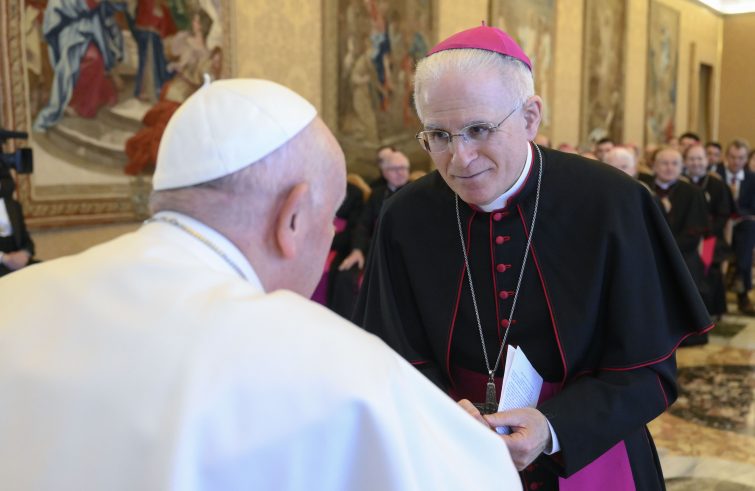
“Unity and peace are the great challenges facing Europe today, addressed firstly by the Pope on numerous occasions, and very important for us in our mission.” In an interview with SIR and Tv2000, Monsignor Mariano Crociata, bishop of Latina-Terracina-Sezze-Priverno and newly appointed President of the Commission of the Bishops’ Conferences of the European Union (COMECE), gave an account of the meeting that the bishops delegates of the EU Bishops’ Conferences had with Pope Francis during the COMECE Spring Plenary Assembly. This important Assembly saw the election of the new president, Monsignor Crociata, and of the four vice-presidents, each representing a different geographical area of the European continent. In his address to the COMECE bishops, the Pope said: “War cannot and must no longer be considered as a solution to conflicts. If the countries of today’s Europe do not share this ethical-political principle – the Holy Father continued – then it means that they have strayed from the original dream.
What is your response to these words of Pope Francis?
The European Union was established in the aftermath of a war that wreaked death and destruction. There was a desire, indeed a need, not to experience events of this kind ever again. Europe is therefore a peace project at its origins and roots.
Our experience today, and this year in particular, is a sad reminder that history repeats itself and returns resembling its past, as if 70 years of peace had gone by in vain.
It is then a matter of rediscovering this aspiration, overcoming every temptation to dominate, prevaricate and impose oneself on others, jointly embarking on the path of dialogue and encounter. This will help us understand that, with mutual respect, we can live in peace and progress together. We are facing a very critical juncture. No one knows how things could unfold. The Pope’s invitation is a reminder to do everything within our reach to continue pursuing Europe’s original dream of peace. The means we have are simple: dialogue, reflection, meetings, contacts, ideas. This is what we can and must do.
The European Council, which brings together EU 27 heads of State and government in Brussels, is currently underway. The situation in Ukraine is an item on the agenda. The discussion often appears to be centred solely on the delivery of weapons. What is your opinion?
There are very complex dynamics indeed, and until the war is allowed to continue, destruction, struggle, and peoples’ tremendous suffering risk continuing inexorably. The suffering of one people in particular.
It is a singular situation in terms of its gravity and tragic proportions. It’s a challenging situation. It is impossible to ignore that we are in the presence of an aggressor and the victim of aggression. Therefore, we must hope that the parties involved will agree to stop and talk under the right conditions, in accordance with the terms set out under – unanimously recognised – international law. Our request to all those with the capacity and the ability to do so is to work in this direction. We will not tire of repeating this, together with the Pope who is constantly renewing his appeal to end the war and find pathways to peace.
The Pope also addressed the subject of unity.
Precisely because the European Union stems from a need for peace, it is a matter of understanding how to combine unity and diversity, as the Pope rightly said. The European project is an original project within the political forms of cooperation and aggregation of States and peoples. It stems from peoples and nations’ determination to come together. Clearly, this desire must be constantly rediscovered and embraced. In this respect, the Pope’s invitation once again highlights a crucial aspect, namely, our own commitment. Moreover, we are the representatives of peoples and communities, as diocesan bishops we are familiar with the joys and struggles people experience in the various regions and social and political contexts.
As Churches, we must become a leaven of this unity and the leaven of a renewed and ever new desire for peace.
Migration is another issue of great concern. People keep on leaving their countries. It is a desperate situation. There are no legal channels for entering Europe. What is your reflection in this respect?
The image we unfortunately have of immigration in our societies is often distorted, falsified, biased. It is a complex movement. Studies show that immigration is by no means a threat. We are not being threatened by an invasion. That message is flawed because it does not respect reality. However, the real problem is that we are dealing with disorderly, uncontrolled immigration flows. Migration is regulated according to instrumental intents, irrespective of the quest for a balanced relationship between those who want to enter and those who actually do, between the countries of departure and the host countries. Europe should strive for that balanced relationship. It should also be noted that there is a disparity among countries exposed to the disorganised and uncoordinated presence of immigrants. Nevertheless, the complexity of the situation is also due to the fact that in many cases immigrants move on from the country in Europe where they had first arrived. Therefore, it is advisable to adopt – over and above clichés, prejudices and stereotypes – an objective approach and an orderly management of people of the move.
It is hoped that this phenomenon will become a point of strength for our western societies, which over the past years have widely experienced the extent to which the presence of immigrants has enriched our societies and made them grow.
In this respect, much work remains to be done to overcome the tendency to oversimplify problems and seek consensus.











